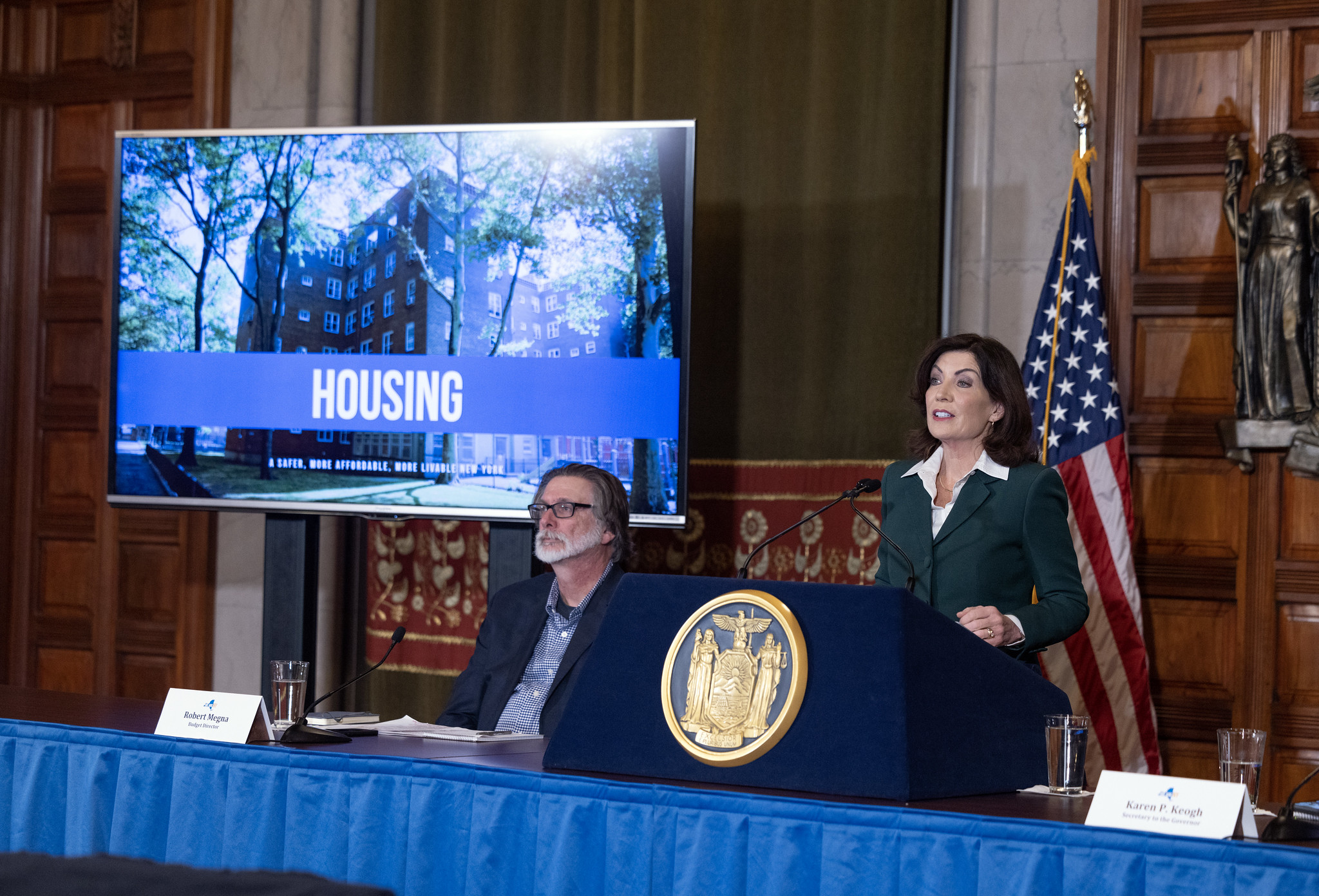
April 27, 2023 – Albany, N.Y. – Governor Kathy Hochul and State Budget Director Robert Megna provide an update on the Fiscal Year 2024 Executive Budget during a news conference in the Red Room at the State Capitol.
After a month-long delay, Gov. Kathy Hochul on Thursday announced a “conceptual agreement” on a $229 billion state budget for the 2024 fiscal year.
The budget would hold State Operating Funds spending to under 3 percent in the coming fiscal year and would increase the state’s reserves to 15 percent, a goal proposed by the governor in the first months of her administration.
According to the New York Times, Senate Majority Leader Andrea Stewart-Cousins and Assembly Speaker Carl Heastie have agreed to the budget deal. The full Legislature is expected to begin voting on the budget bills early next week.
Gov. Hochul highlighted the following items when she announced the agreement Thursday night:
- Giving judges greater discretion to set bail for serious crimes; investing $347 million in evidence-based gun violence prevention initiatives; $170 million to support the implementation of discovery reform for prosecutors and defenders, including $50 million in capital for discovery technology improvements in New York City; $92 million in aid for prosecution and defense funding across the state; and more than $66 million to increase the number of State Police Academy classes and number of troopers dedicated to addressing serious crime
- Dedicating $1 billion for mental health programs — the largest investment in comprehensive mental health care in a generation — and increasing inpatient psychiatric treatment capacity, dramatically expanding outpatient services, and boosting insurance coverage
- Adding $1 billion in health care capital funding and expanded Medicaid coverage for more than 7.8 million low-income New Yorkers
- Allocating $100.7 million to fund abortion providers; expanding access to abortion care for SUNY and CUNY students; providing access to over-the-counter contraception at pharmacies; enacting additional data protections for patients seeking reproductive health care; and increasing the Medicaid reimbursement rate for abortion care
- An annual School Aid allocation of $34.5 billion; full funding of Foundation Aid for the first time in history; reauthorizing 22 charters, including 14 in New York City; and $2.4 billion for new capital projects for SUNY and CUNY
- Funding for child care, including $500 million towards a Workforce Retention Grant Program and $25 million to support the Employer Child Care Tax Credit, and an expansion of the Child Tax Credit to include children under four years old
- Increasing the minimum wage for three years, after which the state’s minimum wage would increase at a rate determined by the Consumer Price Index for Urban Wage Earners and Clerical Workers
- A “major investment” in rental assistance for New York City Housing Authority and other public housing residents, as well as Section 8 voucher recipients and other subsidized housing residents through the Emergency Rental Assistance Program
- Saving the Metropolitan Transportation Authority from the “fiscal cliff” and and “adjusting” the Payroll Mobility Tax for the largest businesses within New York City to 0.6 percent, generating approximately $1.1 billion; a one-time state-aid infusion of $300 million; requiring New York City to contribute $165 million for paratransit services funding; $65 million to reduce the proposed fare increase on the MTA; expanding service frequencies on the subway and launching a pilot program that will provide five free bus routes in New York City
- Implementing a zero-emission requirement for new building construction
- Expanding and enhancing the New York Film Tax Credit aimed at providing a boost to New York’s film industry, one of the largest union employers in the state
- $1.7 billion for a new Department of Health research laboratory; $2.4 billion for transformation, maintenance and preservation projects at SUNY and CUNY campuses across the state; $446 million for Phase Three of the Hunts Point Interstate Access Improvement Project; $105 million to upgrade the State Emergency Operations Center; and $51 million for Hudson Valley Bridge Rehabilitation and Replacements
- Expanding the Medicaid Buy-In Program for working people with disabilities, funding and reinvigorating the Interagency Coordinating Council for Services to Persons who are Deaf, Deaf-Blind and Hard of Hearing and increasing the number of Civil Service Section 55-B positions to grow the representation of those with disabilities in the State workforce
- $10 million to support the establishment of farm markets, supermarkets and food cooperatives in underserved communities; and $50 million over five years to local school districts to support New York state farm products in meals for K-12 school children
- Expanding the enforcement powers of the Office of Cannabis Management and Department of Taxation and Finance to grow the legal marketplace for cannabis, including levying fines on illegal retail operations and closing those shops down
- Supporting aging in place programs and to fighting financial exploitation of senior citizens, elder abuse, and isolation; and increasing funding for the Master Plan for Aging — an interagency plan being developed for seniors living in New York state
“I promised New Yorkers we’d make our state more affordable, more livable and safer, and this budget delivers on that promise,” Hochul said. “I am pleased to have reached an agreement with Speaker Heastie and Leader Stewart-Cousins on a transformative budget that improves public safety, transforms our mental health care system, protects our climate and invests in our children’s future.”









